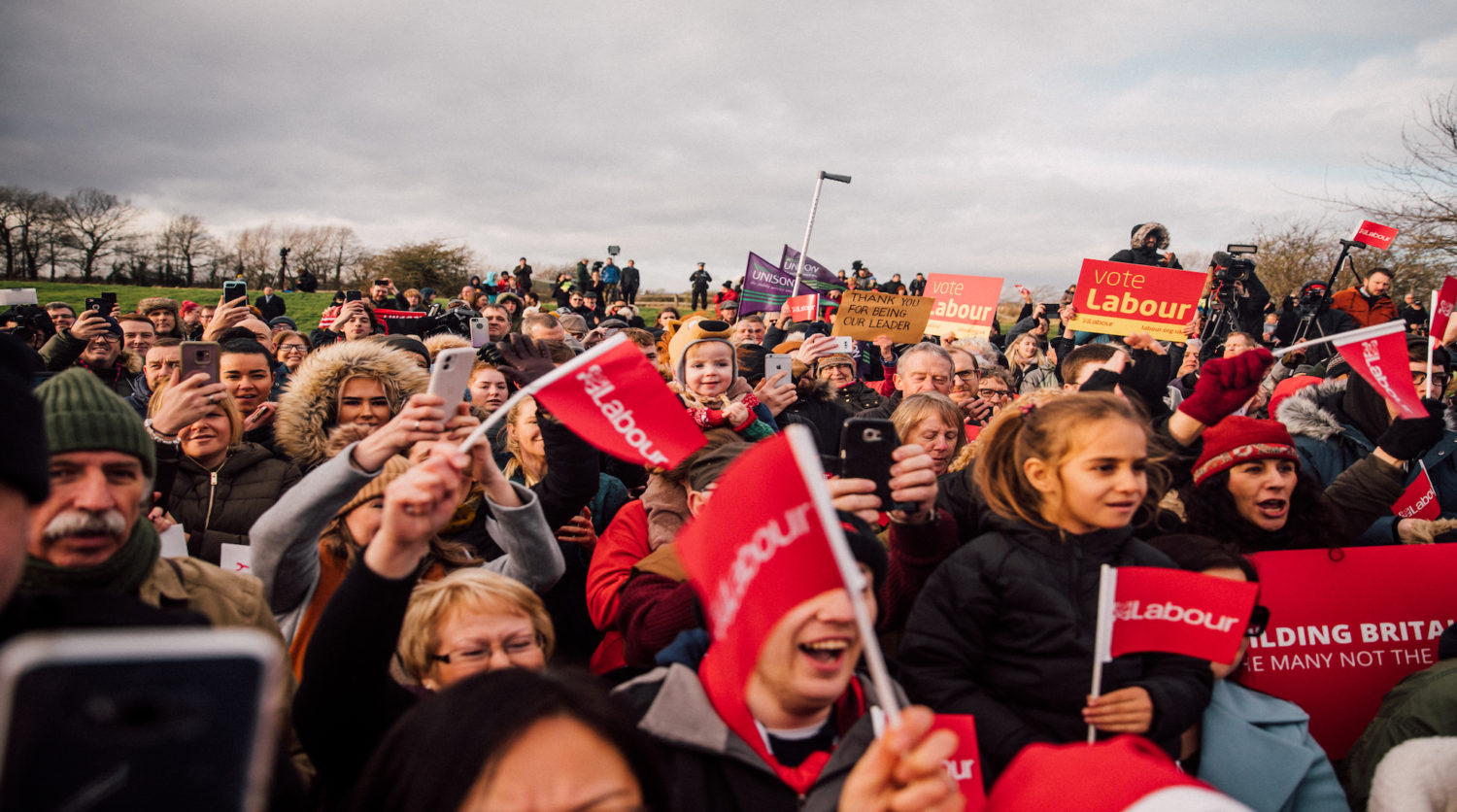The spirit of the left
Labour’s shift back to the centre risks marginalising the creativity and commitment which new members brought to the party, argues Leo Panitch.
Three months after Labour’s defeat in the June 1970 election, the Fabian Society published a pamphlet by Tony Benn, entitled The New Politics: A Socialist Reconnaissance. Warning of the dire consequences of the party ignoring the fundamental reasons for that defeat, Benn chose to leave differences over policy aside for the moment. The real issues, he insisted, had to do with democracy; not only how to fashion intra-party democracy so as to ensure that leaders once elected were accountable to those who had got them elected, but also how leaders both inside and outside the state could help to build the kind of mass popular support for, and involvement in, radical social change.
The central argument of Benn’s Fabian pamphlet was that the only way forward was for the Labour party to open its arms to the new spirit of ‘participatory democracy’ that had developed outside its ranks. Challenging ‘outdated concepts of parliamentary democracy accepted by too many political leaders in parliament and on local authorities’ also involved recognising, Benn insisted, that Labour’s “internal democracy is also riddled with the same aristocratic ideas as deface our national democracy”.
Very much attuned to the new left that had emerged in the 1960s, Benn pointed to the great many activists who, alongside the industrial militancy of so many young workers at the time, spawned the wave of new community associations, the women’s and gay liberation movements and the massive anti-Vietnam war protests. He saw in these new movements “a most important expression of human activity based on issues rather than traditional political loyalties, and [they] are often seen as more attractive, relevant and effective by new citizens than working through the party system.” People were showing that by banding together collectively in a myriad of new organisations with clear objectives they could win surprising victories on given issues against large and centralised corporations and governments which were increasingly vulnerable to dislocations.
But this was only one side of the picture. Far in advance of later commentators, Benn already recognised, with remarkable prescience, an “alternative philosophy of government, now emerging everywhere on the right” which was promising the citizen “greater freedom from government, just as big business is to be promised lower taxes and less intervention and thus to be retained as a rich and powerful ally. But this new freedom to be enjoyed by big business means that it can then control the new citizen at the very same time as government reduces its protection for him.”
It was significant that it was the Fabian Society which published this pamphlet. Its founding belief that state reforms would gradually accumulate so as to usher in a socialist society was itself gradually abandoned with the embrace of the mixed economy by the 1950s. Now the impasse of reform under the 1960s Labour government was not only encouraging a new free market philosophy of government on the right, but also a better understanding on the left of the limits of reform in what Ralph Miliband in 1969 called ‘the state in capitalist society’. It was increasingly clear, not least from the renewal of the City of London as a centre of international finance, that even to hold on to the old reforms would require going beyond them to take capital away from capital. How to effect a democratic transition to socialism was back on the agenda. When party policy shifted to the left as Labour went into opposition in the early 1970s, it proved somewhat more attractive to the new activists, but the cold reception they often faced as new members was still deeply rooted in the Cold War atmosphere that suffused party HQ in the 1950s. This was graphically described by Ron Hayward, who would become general secretary in 1972:
“We all pay lip service to recruit new members into the party… But, if we are going to “tie labels” around their necks at first sight or after hearing their first views, then we ought not to pretend that we believe in ‘democracy’, ‘communication’ and ‘liaison’… The clobbering of a member usually new to our ranks is the only bit of life this type of party shows from year to year.”
The bitterly fought struggles over the democratic intraparty reforms which were commonplace in most social democratic and liberal parties around the world consumed the Labour new left for over a decade. Its marginalisation was already in train well before the 1983 election, not only in the PLP but also at party HQ. Notably, Benn’s protégé, Jeremy Corbyn (the two had met even before the 1970 Fabian pamphlet was published) identified ‘the incompetence of the party machine’ as explaining more about Labour’s momentous election 1983 defeat than its radical manifesto did, no doubt referring tacitly to the overall electoral effects of party officials who, under the glare of a sensationalist media in the immediate run-up to the election, readily deployed ‘loony left’ epithets against certain Labour candidates.
The new left’s further marginalisation in the party in the 1980s eventually paved the way for New Labour’s own embrace of a ‘new philosophy of government’ in the 1990s. But what was not new was the reproduction among party officials appointed under the Blair regime of the old intolerance of movement activists, as the recently leaked report has revealed, showing how a new generation of left-wing activists drawn into the party by Corbyn’s 2015 leadership campaign were regarded by party HQ.
The 2017 election campaign could be seen as demonstrating, as Corbyn put it in his post-election speech at conference, that armed with “the programme of a modern, progressive socialist party that has rediscovered its roots and its purpose”, Labour could be electorally successful. To carry this further, Corbyn insisted, “our democracy needs to break out of Westminster into all parts of our society and economy where power is unaccountable.”
Yet by depriving Theresa May’s government of its majority, this very electoral success meant that the next phase of politics would take place in Westminster, not in the country at large –– the precise opposite of what Corbyn saw as the all-important next step for the left’s democratic advance. As Corbyn himself became inevitably immersed in the arcane complexities of parliamentary procedure around Brexit, his personal political profile was transformed from the inspiring leader of a mass repudiation of both Thatcherism and New Labour, to a rather desultory PMQs performer at the dispatch box, in a House of Commons which still bore all trappings of a gentleman’s club, albeit one which admitted women as members.
December 2019 may be seen as marking the furthest point to which the generation formed in the 1970s was able to carry the Labour new left project. What legacy has it left to the new generation that it drew into the party since 2015? In terms of democratising party structures, not very much.
The replacement of Iain McNicol as general secretary was hardly democratic, as Jennie Formby was appointed amidst a behind-the-scenes stitch-up between the leader’s office and the leadership of Unite. The democracy review delivered very little beyond its BAME reforms, while the undemocratic effect of a preponderance of senior union personnel in key roles at party HQ led to union-backed candidates being imposed on a significant number of CLPs. Despite the establishment of a new ‘community organising team’ to work in key marginal constituencies, little was accomplished by way of enlivening CLPs as centres of community life. Indeed, few of the new members, most of whom joined at the national level, ever attended branch meetings.
The main legacy of the Corbyn interregnum in fact lies outside the official party structures, in Momentum and its offshoot, The World Transformed. The way the latter has enlivened party conferences – with a four-day festival of radical art, music and culture combined with wide-ranging strategic political discussion, contrasting sharply with the trade-show atmosphere of the New Labour years – may itself be counted as a major democratic advance in British political life. And whatever Momentum’s own internal democratic challenges and its current divisions – its brilliant role in election campaigning, which put the party machine to shame, exemplified the remarkable commitment and creativity of the new generation of socialists Corbyn attracted to the party.
Perhaps the most telling passage in the recently leaked report on Labour’s internal handling of charges of antisemitism and the infighting within the party concerns an exchange between two Labour party regional officials discussing Momentum’s initiative in 2016 to recruit their own regional organisers. This development threatened the regional officials’ control of the party at the grassroots, but one of them frankly admitted that Momentum’s underpaid organisers would “do the groundwork we cannot be arsed doing and they will engage the members in a way we cannot be fucked with. They are going to be so motivated”. The promise to rid the Labour party of factionalism in response to this leaked report is in its own way troubling. Calling it ‘factionalism’ tends to imply a kind of equivalence between the new activists who were attracted into the party by Corbyn and those who so readily traduced them all as ‘trots’
It would not be at all surprising, based on its past history, if the Labour party’s reversion to the radicalism of the centre now brought with it a marginalisation of those newly committed to reviving the search for a path to realise the kind of democratic socialist vision Benn articulated in 1970. But in face of the irrationalities, let alone the inequalities, of capitalism in the 21st century, it would be more unfortunate than ever.
Image credit: Jeremy Corbyn/Flickr

